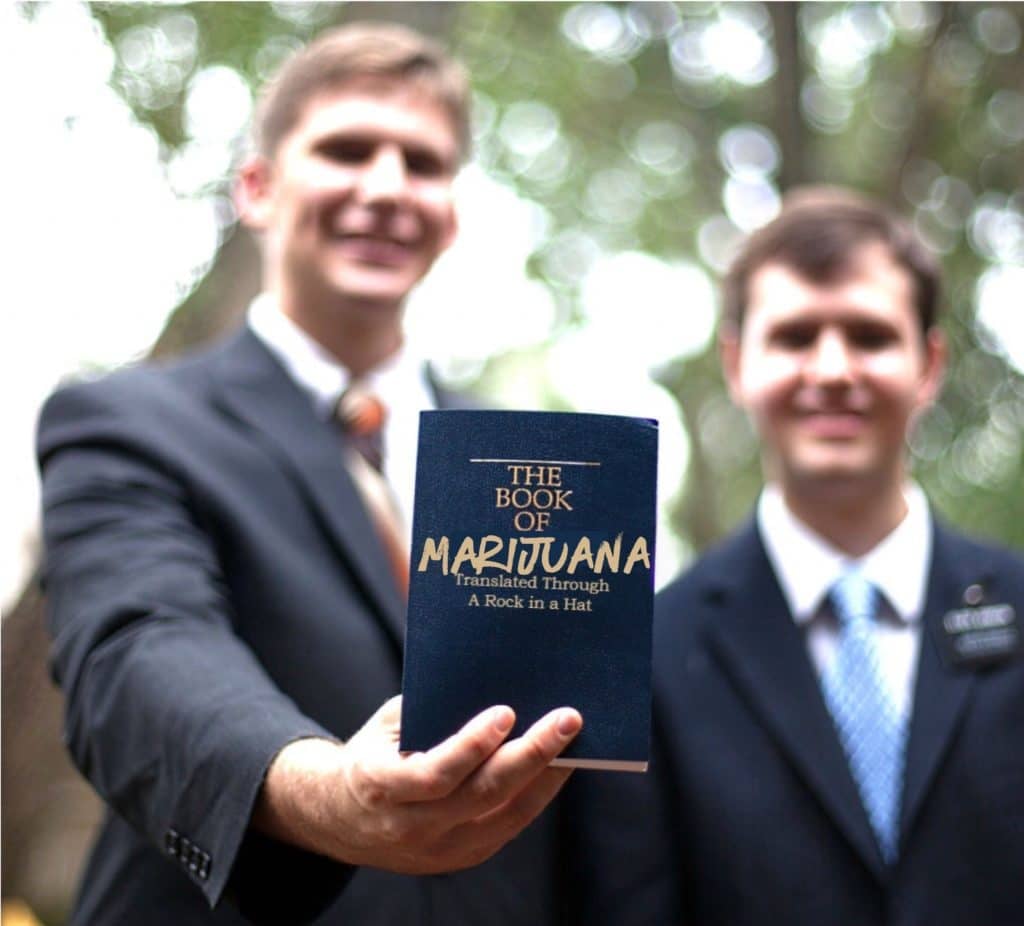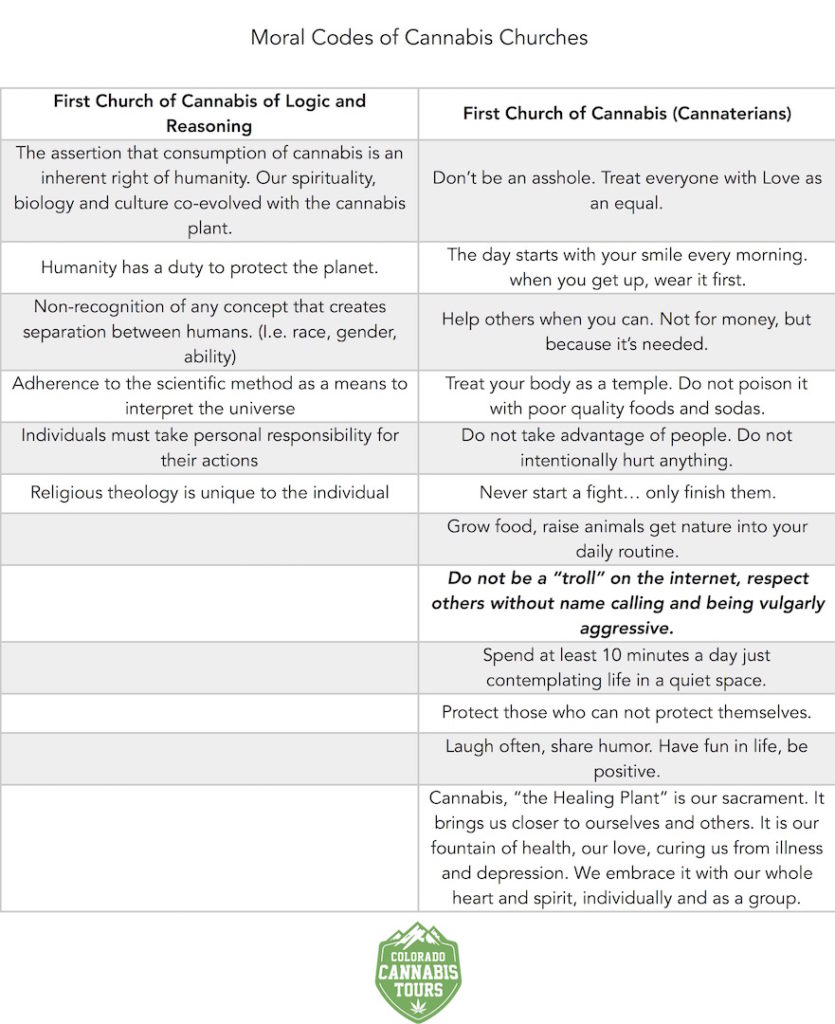
Marijuana Missionary
If you’re reading this, you’ve probably experienced the feeling of connectedness and spirituality that arises after that first toke of cannabis. And if you’ve consumed regularly with a group of friends, you’ve probably noticed that you collectively adopt certain rituals when smoking together. Call it history and human nature. We like to assemble and get high together. Occasionally we like to spread the word of our experiences with others, although bring a missionary for marijuana is still pretty rare. The link between ritual, cannabis and spirituality throughout history and culture is nothing new. So it should come as no surprise that now there is an official church organized around cannabis, the First Cannabis Church of Logic and Reason.
When I first spoke to Jeremy Hall, my first question to him was to ask about his religious background. He is originally from Tennessee, and grew up in an “extremely Christian” creationist household, where the Bible was taken literally. Although he enjoyed the community and fellowship of the church he attended, he started thinking for himself at the age of eleven, and began a difficult journey of undoing the programming from his early youth. He started studying all religion, but never found another one that matched his personal beliefs. At a certain point, he said, he decided to just be okay with his own spirituality. And this premise is what the First Cannabis Church of Logic and Reason is founded on.
Jeremy is an ordained minister of the Universal Life Church, as well as a Pastafarian. He claims that he did not start the FCCLR with the intention of being rich and famous, but in order to redefine church in the same vein as redefining cannabis. He understands that going to church may not be something a lot of people look forward to, so he started his organization as an alternative to the typical requirements of church where parishioners are expected to have a specific set of beliefs. He wants to promote a concept of theology that is inclusive, and that encourages people with similar views to “gather in fellowship”.
Cannabis is central to his church, because he believes that the plant promotes peace. When he was 16 he began consuming cannabis daily, and has continued ever since. In addition to consuming for spiritual and recreational reasons, Jeremy also uses cannabis medicinally. He and his wife moved to Michigan in order to take advantage of medical marijuana laws, so that they could grow cannabis to treat his wife’s lupus and his own chronic headaches. They donate their excess crop to the community.
No tithing or revenue is required from members of the church. But he is exploring ways to generate revenue in order to stay in existence. This may include eventually charging people to become an ordained minister by the church, (similar to The Church of the Flying Spaghetti Monster). Reverend Hall says it is far too early in the beginning stages to know what it will all look like yet. “We need to get through at least the 2nd service”.
Parishioners of the church haven’t settled on a name yet. There are plans to send out a poll through SurveyMonkey to figure out the best name. Meetings in Lansing are temporarily being held in a space donated by the local Farmer’s Market. Lansing allows adults over 21 to lawfully consume cannabis on private property. This could technically allow the church to donate cannabis and allow people to smoke during services, but for now they wish to remain respectful and only allow med card holders to do so in a separate space.
Components of a Cannabis Church
It turns out that the First Cannabis Church of Logic and Reasoning isn’t actually the first after all. There is a Cannabis Church in California, and the more well-known Cannaterians of Indiana. Jeremy says they provided inspiration for his own church. The main difference between the Cannaterians and his own church is that since the City of Lansing allows recreational consumption of cannabis for adults over 21, it implicitly allows for his parishioners to consume cannabis. In Indiana cannabis is still illegal, so the Cannetarians had to establish their church as a way for their members to even access cannabis. Jeremy said he was grateful that this allows the focus of his church to be about doing good.
Their are certain components of any genuine church. Here are how the FCCLR and the Cannetarians compare:
Pastoral leaders:
The First Cannabis Church of Logic and Reasoning is led by the Reverend Jeremy Hall. The Cannetarian congregation has “poohbahs” and ministers.
Tithing:
If you want to be a Cannaterian, plan on paying $4.20 a month. This gets you a membership card that doesn’t provide much other than bragging rights. No tithing is required to be a member of the FCCLR. Both have a place to worship, although the FCCLR is currently looking for a permanent home.
Moral Code that addresses moral and existential concerns:

It should be noted that “thou shall not be an internet troll” is clearly the best commandment ever written.
But is a Church Necessary?
When I was able to interview Jeremy, I was pleased to find out that he and I had similar religious backgrounds. He had broken out of a deeply indoctrinated religion in his youth, and had confronted the programming that independent thinking meant condemnation to Hell. Being an ex-Mormon, I can relate to how soul-crushing that is for a person, and I have tremendous respect for Jeremy and his goals. His motivations seem to be completely genuine, and I’m impressed that he embraces the scientific method as a central tenet of the religion he has founded.
But the skeptic in me wonders whether these good intentions will be sustainable over time. Is there really a need to worship cannabis and be together? History shows that once religion becomes organized, humans tend to lose sight of the reasons why they started the church in the first place. Here’s hoping this latest church keeps the faith.
- National Cannabis Legalization Update - December 22, 2017
- DEA Fog “Clarification” Of Hemp Extract Legality - December 20, 2017
- Should You Be A Cannabis Activist If You Have A Family? - December 4, 2017
